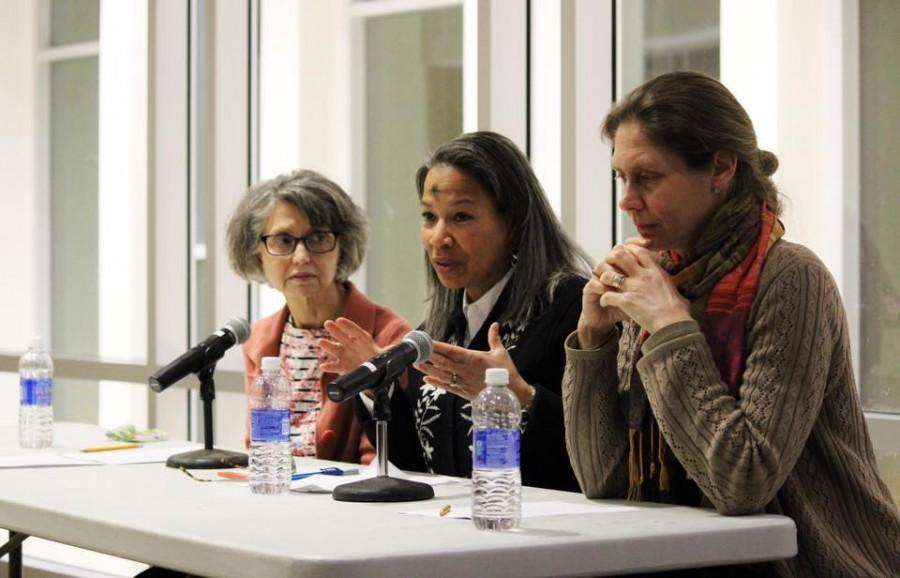Let’s talk: Panel discusses connections between differences, violence, and tolerance
Photo credit/ Kyle Clouse
From left to right, Dr. Christine Kessen, Dr. Lia Richards-Palmiter, and Dr. Melinda Krokus speak at the difference, tolerance, and violence discussion panel on Feb. 10.
February 14, 2016
Members of the Marywood community attended a recent event on campus to discuss issues revolving around differences, tolerance and violence.
From 5:30 p.m. to 7 p.m. on Feb. 10 in the Upper Main Dining Hall of the Nazareth Student Center, approximately 40 members of the Marywood community attended a panel/discussion called “Difference, Tolerance and Violence.”
The Center for Social Justice and Community Collaboration at the School of Social Work presented the event as a way to discuss how tolerance and a lack thereof can either lead to the understanding of others or violence.
Graduate students Bethany Coons and Ly’Esha Fleming prepared a slide show that featured quotes and statistics related to tolerance and violence. The slideshow played throughout the event.
Panelists for the discussion included Dr. Lia Richards-Palmiter, the director of the office of diversity; Dr. Christine Kessen, associate professor of social work; and Dr. Melinda Krokus, assistant professor of religious studies. Dr. Patricia Weldon, assistant professor of social work, hosted the event.
“The goal of this is about awareness of intolerance as well as taking action,” said Weldon, whose first question was whether or not the panelists saw a connection between differences, violence and tolerance.
Weldon prepared questions that the panelists had viewed prior to the event, and the discussion for the first hour of the event revolved around Weldon’s questions. Attendees were able to ask questions during the final half hour.
Krokus stated that many people engage in the process of “othering,” which is when people “see others as different” and consequently treat them as such. Kessen reiterated this point by using the examples of felons and enemies during wartime, saying that people tend to objectify groups as “others” as a way to strip them of rights. Kressen said that a way she tries to avoid this is by using other faiths to help her objectify less and appreciate more.
Another topic discussed was whether or not violence is more acceptable in today’s society.
“Having grown up in the ’50s, the violence was much more severe,” Kressen said. She cited gender and race roles as a reason for the violence. “Now, I see [violence] as being more out there for us to critique and evaluate.”
Weldon also addressed biases and how people gain self-awareness of their own biases, and Richards-Palmiter stated that discussing difficult topics is a necessity.
“When people are uncomfortable, they don’t [talk],” said Richards-Palmiter. “We smooth over it and try to lessen that tension. Stop being defensive or guilty–feel that person and listen. Get past being uncomfortable; it is a good feeling, a sign of growth.”
Kessen added, “Becoming aware of other people’s needs is a lifelong journey,” and suggested that people listen to others’ stories as a way to gain awareness.
“In terms of privilege, we see what we have after talking to others,” said Kessesn. “We need to give ourselves a break and understand we’re not perfect.”
In the discussion portion of the panel, Sr. John Michele, IHM, assistant director of campus ministry, reiterated Kessen’s point of self-acceptance. “We are not tolerant with ourselves,” Sr. John said. “The idea of being tolerant starts with ourselves.”
Contact the writer: a[email protected]
Twitter: @ADuncklee_TWW





